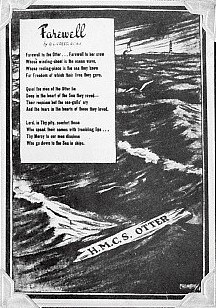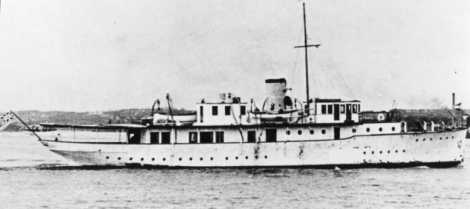Jimmy Noade cradled the injured man in his arms. What was his name? Noade remembered him only as Walker. He was the Chief Officer aboard HMCS Otter and right now he was in bad shape, his body a limp rag, his voice a pale imitation of itself.
For what seemed like days, Noade, Walker and another sailor named Tommy Ward had huddled together in the hollow of this lifeboat — frozen, frightened and soaked to the bone — waiting for rescue. The fourth man in their boat, Everett Gillis, the Otter’s Chief Motor Mechanic, was already beyond rescue.
Were they doomed too?
A gale-force sou’easter whipped the seas around them into monstrous, storey-and-a-half high waves that battered their helpless little vessel as it corked from crest to trough in the waters off Halifax Harbour.
“Is there anything in sight?” Walker asked plaintively.
There was. Off in the distance. That freighter again, the one they’d tried unsuccessfully to board an hour or so earlier.
“Yes,” Noade told Walker simply. “There’s a freighter over there.”
Walker started to look to where Noade’s hand was pointing but, suddenly, his head fell forward. He was dead too.
Just me and Tommy now, Jimmy Noade thought to himself.
How much longer could they hold on?
** ** **
In truth, it had only been a few hours since an accidental explosion and fire aboard HMCS Otter on the morning of Mar. 26, 1941 had forced Noade and his 40 shipmates to abandon ship.
Normally, the Otter, a peacetime yacht transformed into a wartime coastal patrol vessel, spent its days sailing monotonously back and forth across the mouth of Halifax Harbour, watching for floating mines and German subs. They had yet to encounter either.
But the war itself was not going well for the Allies. Nazi wolf packs were decimating Allied convoys in the middle of the North Atlantic. So far, at least, thanks in no small part to the vigilance of the crew of the Otter, none had penetrated Halifax’s harbour defences.
That may be one reason why reports of this early morning tragedy would quickly become one of the biggest local news stories of World War II’s first two years. There was also the not inconsiderable fact that, unlike the multinational merchant crews who were often brought back to Halifax after their convoy vessels were sunk at sea, the Otter’s sailors, including Jimmy Noade, were mostly local boys doing their duty for King and country. The war suddenly seemed very close to home.
** ** **
Jimmy Noade had been sleeping in his quarters when he was wakened by the sound of an explosion around 8:30 a.m. Although he and other crew members tried to fight the fire that followed, the intense heat forced them back. By the time they climbed to the fog-and-smoke-choked deck, the fire had already ripped through most of the ship’s hull. There was nothing to do except save themselves.
For his part, Noade managed to scramble into Lifeboat No. 1 just as it was being lowered over the side into the storm-tossed waters.
Luckily, a passing Polish freighter soon spotted the lifeboat; its crew dropped rope ladders over the side of their ship for Noade and the 10 others to clamber aboard. One of the Otter’s sailors had just grabbed hold of a rope ladder, in fact, when a rogue wave crashed into the lifeboat. It bucked like a wild horse, then flipped completely over, tossing everyone into the ocean.
The freighter’s crew frantically lowered their own two lifeboats over the side to try and rescue the drowning Canadian sailors. But the wind proved too strong and both small boats smashed to bits against the hull. When one of the Polish sailors, a bos’un, tried to hold one of the lifeboats to keep it from banging back into the freighter, he ended up with several broken ribs.
Meanwhile, back in the roiling waters, Noade and the others worked frenziedly to right their capsized lifeboat. As they did, another frantic sailor — Noade couldn’t remember his name either, but knew he was from Montague, P.E.I. — desperately clutched at Noade and pulled him under the water. Noade wanted to help him, but the sailor wouldn’t calm down. Finally, Noade had no choice; he had to push him away. Noade struggled back to the surface, sputtering and gasping for air. He never saw the man again.
No time to think about that now.
He and three others from their original complement of 11 had dragged themselves into the finally uprighted lifeboat and were within range of the freighter’s rope ladders again. But now, neither Noade nor Ward had the strength to grab hold. Instead, they huddled together in the lifeboat, water up to their waists, and waited for rescue. Or death.
To keep up the circulation in their arms and keep warm, Noade and Ward played the children’s game of patty-cake.
Finally, a brave Polish able seamen by the name of Ptzybliski tied a rope around his own waist. “Here,” he said to one of his shipmates, handing him the other end of the coiled rope. “Lower me down.” Once aboard the lifeboat, Ptzybliski quickly wrapped the rope around Tommy Ward’s chest and gave a signal to the crew on deck to haul him aboard. It was Jimmy Noade’s turn next. Before he knew it, he too was on the deck being tended to by the crew of the merchant ship — a melting pot of Poles, Brits, Irish, Greeks, French Africans, Estonians and Yugoslavians — speaking in languages he didn’t understand.
Ptzybliski, just one of many heroes that day, stayed in the lifeboat, hip deep in water, until he could get the bodies of Chief Officer Walker and Chief Motor Mechanic Gillis aboard too. Up on the deck, the merchant sailors took turns applying artificial respiration and gently rubbing their bodies with alcohol, trying in vain to warm them. Finally, after two hours, the captain acknowledged it was hopeless. They carried the two bodies into the ship’s saloon, laid them side by side and covered them with a single Union Jack.
By then, a second lifeboat from the Otter, this one with 15 more crewmen aboard, had reached the freighter too. Luckily, these men — including Capt. Denis Mossman, who’d been the last to leave the burning patrol boat before it shuddered and sank — were in much better shape than the first lot and were able to climb up the rope ladders without assistance.
That left just one last group of men still alive in the water. Fifteen more sailors had evacuated the Otter in a carly float, an inflatable raft. A Royal Navy submarine that had joined the Polish freighter in the search for survivors spotted the bobbing raft and came as close as it dared before heaving a life line to the men on board. Eleven of the original 15 were already dead. Thomas Guildford, an able seaman from Bedford who was in the best shape of the four survivors, wrapped the rope around each of his comrades so they could be hauled in turn through the frigid waters to the sub. By the time it was Guildford’s turn, however, the carly float had drifted so far away from its rescue vessel the sub’s crew could no longer reach it with their life lines and Guildford himself was now too weak to guide the raft closer.

It was over.
The death toll that day was 19 men. But 22 other sailors, including Jimmy Noade and Tom Guildford, survived, thanks in no small part to their own — and many others’ — heroism that day.
By the next morning, Jimmy Noade was not only eager to return to sea but he had also regained his good humour.
“In my application to join the navy, they asked me what was my best sport,” Noade wryly told Eric Dennis, a reporter for the Halifax Herald who had come to the hospital to interview him. “I wrote swimming.”
***
This is one of many fascinating tales of wartime Halifax that didn’t make it into the pages of Sailors, Slackers, but still seems worth remembering — and celebrating.
Stephen Kimber’s award-winning 2003 nonfiction book, Sailors, Slackers and Blind Pigs (Doubleday), tells the story of what life in Halifax was like during World War II.







 STEPHEN KIMBER, a Professor of Journalism at the University of King's College in Halifax and co-founder of its MFA in Creative Nonfiction Program, is an award-winning writer, editor and broadcaster. He is the author of two novels and eight non-fiction books. Buy his books
STEPHEN KIMBER, a Professor of Journalism at the University of King's College in Halifax and co-founder of its MFA in Creative Nonfiction Program, is an award-winning writer, editor and broadcaster. He is the author of two novels and eight non-fiction books. Buy his books
My dad , William T Bennett was also on the Otter and survived . We could never get anything out of my dad as to what happened that day , he would not talk about it , I wish he .